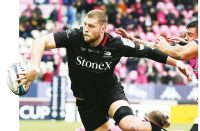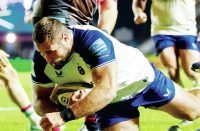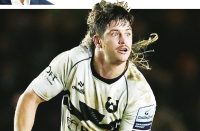 Argentina have more than proved their worth in the revamped Tri-Nations, now the Rugby Championship, by drawing with South Africa when they got them at home in round two.
Argentina have more than proved their worth in the revamped Tri-Nations, now the Rugby Championship, by drawing with South Africa when they got them at home in round two.
I’ve been analysing the matches as a rugby pundit for OSN Sports in Dubai and I don’t think that even the most diehard Springbok supporter would deny that the Pumas deserved victory rather than a 16-16 draw in Mendoza.
It was an out-of-nowhere chargedown by Frans Steyn of a kick from Marcelo Bosch that gifted the Boks a try and saved their blushes, because before that they had not looked like scoring a touchdown. Argentina have learned quickly and were a completely different prospect from the previous week in Cape Town where they froze, and looked a bit like rabbits in headlights.
The difference is that where Argentina made progress, South Africa did not – and their lack of any inspiration in either game, home or away, must worry Heyneke Meyer.
However, Meyer is also the problem. The South African coach has persisted in a very Blue Bulls fashion of play, which, if it is matched in terms of physicality, doesn’t leave his side with many other options. I don’t believe Meyer will change a great deal, which is a massive shame because this Springbok team has the talent to blow opponents away.
It is a frustrating approach and difficult to understand because the Springbok backline is dangerous. Bryan Habana has found his hunger for the ball and is scoring again, and new captain Jean de Villiers has great all-round skills at centre. But, although De Villiers is a big threat in attack – and defence – he hasn’t demanded the ball for his backs. Maybe that’s because Morne Steyn has been indifferent at fly-half, and his centre partner Frans Steyn looks as though he ate everyone’s meals at his recent wedding.
In the pack Eben Etzebeth and Andries Bekker are going to be a formidable lock pairing. Bekker takes all at the lineout and thinks of himself as a bit of an enforcer, although he has miles to go to be in the same league as the master, Bakkies Botha. Etzebeth is a find and a half. He’s only 20, and if he can shake the ‘special one’ attitude then he will develop into a brilliant second row.
The South African back row, as always, is very difficult to contain, with Willem Alberts rampaging and bashing big holes in the defence but, sadly, lacking the nous to off-load to support runners against the Pumas. Marcel Coetzee is a great find at flanker, but, although he works tirelessly, there doesn’t seem to be much link between 6, 7 and 8 – and therein lies the problem with Meyer’s Springboks. Rather than playing as a team, or as well-oiled units, they look like a bunch of individuals.
South Africa seem to be missing the leadership and experience of recently departed veterans, and the season-ending injury to Bismark du Plessis in Cape Town hasn’t helped. The Springboks need an inspirational touch, but I’m not sure it will be allowed to surface while they are coached by Meyer. He is blinkered and cannot see past the old bish-bash-bosh, kick-and-chase, ‘we are stronger than you’ attitude. The problem is that outlook only takes you so far, as we witnessed in the Super 15 final when the Chiefs (NZ) overwhelmed the Sharks (SA).
At first, Argentina looked uncomfortable on the big stage, and in the Newlands opener they failed to execute the basics well, with their restored superstar, Juan-Martin Hernandez – who had returned at fly-half for the Championship – suffering most. Hernandez was sadly lacking those sublime skills that took Argentina to third place in the 2007 World Cup, and looked every bit like a man who has played very little rugby over the last five years. There were a few rare glimpses that he still possesses those classy touches and steps, but his kicking talent went missing, and there were not only too many missed penalties but also high kicks that were often too far for Argentina’s chasers to challenge, or to put a defensive wall in front of the Springboks.
The Pumas tried to get their rolling maul active in the first Test but the South African pack stopped it most of the time at source or infiltrated the maul to break it up. The Boks were far more intense at the breakdown and the Pumas couldn’t handle the physicality, which surprised me, because this was their first taste of the Southern Hemisphere big time.
However, in the space of seven days Argentina were transformed in terms of urgency, physicality, and accuracy in Mendoza – and, with the inexperienced Nicolas Sanchez replacing Hernandez, who was ruled out by a hamstring injury, they had more cohesion to their game. Credit must go to Santiago Phelan, the Pumas coach, for organising and firing them up to respond with a performance which was as good, if not better, than the one the Italians produced for their landmark Six Nations win over France in Rome 18 months ago.
Argentina didn’t ambush South Africa, instead they stood toe-to-toe, and, with the home crowd baying for revenge, they very nearly took the Springbok heavyweights down. At the breakdown it was the total opposite of the week before, with the Pumas seemingly possessed by an inner strength that the Boks couldn’t deal with it.
The Pumas backline, which had looked lightweight in Cape Town, fired into action causing problems with good running lines and off-loads. The Argentine try was out of the top draw, incorporating phases of play, off-loading and a beautiful line by Santiago Fernandez to go over unopposed.
Argentina will be disappointed not to have recorded a first win against South Africa, but I hope they can draw great inspiration from it and challenge the All Blacks and Wallabies, particularly at home.
One Comment
Leave a Comment
You must be logged in to post a comment.























Pingback: ติดตั้งโซลาเซลล์